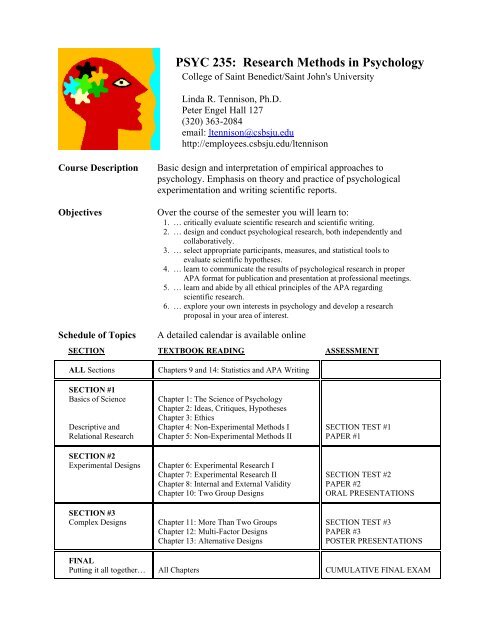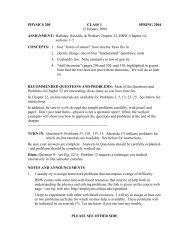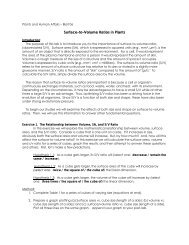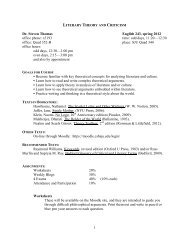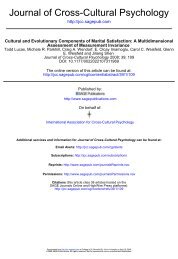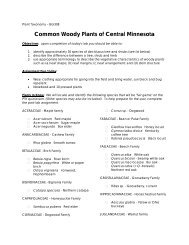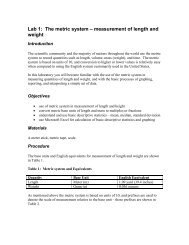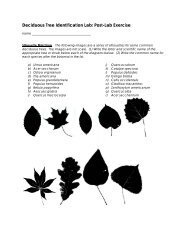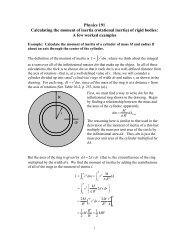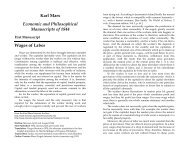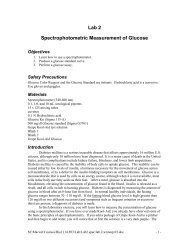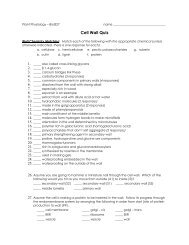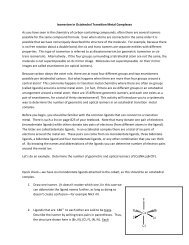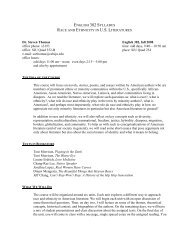PSYC 235: Research Methods in Psychology - Employees Csbsju
PSYC 235: Research Methods in Psychology - Employees Csbsju
PSYC 235: Research Methods in Psychology - Employees Csbsju
Create successful ePaper yourself
Turn your PDF publications into a flip-book with our unique Google optimized e-Paper software.
<strong>PSYC</strong> <strong>235</strong>: <strong>Research</strong> <strong>Methods</strong> <strong>in</strong> <strong>Psychology</strong><br />
College of Sa<strong>in</strong>t Benedict/Sa<strong>in</strong>t John's University<br />
L<strong>in</strong>da R. Tennison, Ph.D.<br />
Peter Engel Hall 127<br />
(320) 363-2084<br />
email: ltennison@csbsju.edu<br />
http://employees.csbsju.edu/ltennison<br />
Course Description<br />
Objectives<br />
Basic design and <strong>in</strong>terpretation of empirical approaches to<br />
psychology. Emphasis on theory and practice of psychological<br />
experimentation and writ<strong>in</strong>g scientific reports.<br />
Over the course of the semester you will learn to:<br />
1. … critically evaluate scientific research and scientific writ<strong>in</strong>g.<br />
2. … design and conduct psychological research, both <strong>in</strong>dependently and<br />
collaboratively.<br />
3. … select appropriate participants, measures, and statistical tools to<br />
evaluate scientific hypotheses.<br />
4. … learn to communicate the results of psychological research <strong>in</strong> proper<br />
APA format for publication and presentation at professional meet<strong>in</strong>gs.<br />
5. … learn and abide by all ethical pr<strong>in</strong>ciples of the APA regard<strong>in</strong>g<br />
scientific research.<br />
6. … explore your own <strong>in</strong>terests <strong>in</strong> psychology and develop a research<br />
proposal <strong>in</strong> your area of <strong>in</strong>terest.<br />
Schedule of Topics<br />
A detailed calendar is available onl<strong>in</strong>e<br />
SECTION TEXTBOOK READING ASSESSMENT<br />
ALL Sections<br />
SECTION #1<br />
Basics of Science<br />
Descriptive and<br />
Relational <strong>Research</strong><br />
SECTION #2<br />
Experimental Designs<br />
SECTION #3<br />
Complex Designs<br />
Chapters 9 and 14: Statistics and APA Writ<strong>in</strong>g<br />
Chapter 1: The Science of <strong>Psychology</strong><br />
Chapter 2: Ideas, Critiques, Hypotheses<br />
Chapter 3: Ethics<br />
Chapter 4: Non-Experimental <strong>Methods</strong> I<br />
Chapter 5: Non-Experimental <strong>Methods</strong> II<br />
Chapter 6: Experimental <strong>Research</strong> I<br />
Chapter 7: Experimental <strong>Research</strong> II<br />
Chapter 8: Internal and External Validity<br />
Chapter 10: Two Group Designs<br />
Chapter 11: More Than Two Groups<br />
Chapter 12: Multi-Factor Designs<br />
Chapter 13: Alternative Designs<br />
SECTION TEST #1<br />
PAPER #1<br />
SECTION TEST #2<br />
PAPER #2<br />
ORAL PRESENTATIONS<br />
SECTION TEST #3<br />
PAPER #3<br />
POSTER PRESENTATIONS<br />
FINAL<br />
Putt<strong>in</strong>g it all together… All Chapters CUMULATIVE FINAL EXAM
Requirements and<br />
Grad<strong>in</strong>g<br />
REQUIRED TEXTS<br />
Smith, R.A. & Davis, S.F. (2007). The psychologist as detective (4th ed.). Upper<br />
Saddle River: Prentice Hall.<br />
Additional read<strong>in</strong>gs as assigned by the <strong>in</strong>structor.<br />
EXAMS<br />
There will be three section tests and one cumulative f<strong>in</strong>al exam. Each section test<br />
will be worth a maximum of 50 po<strong>in</strong>ts and will consist of identification, multiple<br />
choice and essay questions cover<strong>in</strong>g <strong>in</strong>formation presented <strong>in</strong> the assigned read<strong>in</strong>gs<br />
and class discussion.<br />
The cumulative f<strong>in</strong>al exam will be similar to the section tests, both <strong>in</strong> format and <strong>in</strong><br />
po<strong>in</strong>t value, but will be optional for those who are satisfied with their grades based<br />
upon the section tests. If you choose to take the f<strong>in</strong>al it WILL count <strong>in</strong> your overall<br />
grade.<br />
All section tests and the f<strong>in</strong>al exam must be taken at the times that they are scheduled.<br />
There will be a 10% per day reschedul<strong>in</strong>g penalty (whether late or early). Exceptions<br />
to this policy will be made only for unavoidable conflicts or emergencies. Please<br />
plan accord<strong>in</strong>gly.<br />
PAPERS AND<br />
PRESENTATIONS<br />
You will complete three APA format papers dur<strong>in</strong>g the course of the semester. The<br />
first will report the results of survey research that we will conduct as a large group.<br />
The second will describe a simple experiment that you will design and conduct <strong>in</strong><br />
small groups. The third will be a research proposal that you will develop and design<br />
<strong>in</strong>dependently. Carefully note below which papers may be written collaboratively<br />
and which must be written <strong>in</strong>dependently.<br />
Paper #1: Survey <strong>Research</strong>: APA format paper<br />
- operationally def<strong>in</strong>e key variable(s)<br />
- select sample<br />
- reduce data - descriptive statistics<br />
- select correlation<br />
- <strong>in</strong>dividually complete proper APA format s<strong>in</strong>gle experiment paper<br />
Paper #2: Simple Experiment: APA format paper and oral presentations<br />
- design s<strong>in</strong>gle factor, two level experiment<br />
- test hypothesis<br />
- collaboratively complete proper APA format s<strong>in</strong>gle experiment paper<br />
- collaboratively prepare and present convention-style talk<br />
Paper #3: <strong>Research</strong> Proposal/Factorial Design: APA format paper and posters<br />
- design two-factor experiment<br />
- plan all methodologies <strong>in</strong> advance<br />
- <strong>in</strong>dividually complete proper APA format research proposal<br />
- <strong>in</strong>dividually prepare and present convention-style poster<br />
All papers must be <strong>in</strong> proper APA format, which will be covered <strong>in</strong> extensive detail <strong>in</strong><br />
lab. Late papers will be penalized 10% for each day past the due date that they are<br />
submitted (<strong>in</strong>clud<strong>in</strong>g the weekends!). Early papers will be gladly accepted.<br />
Scor<strong>in</strong>g rubrics and additional <strong>in</strong>structions will be provided dur<strong>in</strong>g lab. Complete,<br />
properly-formatted drafts will be reviewed by the <strong>in</strong>structor as time allows.
LAB ACTIVITIES<br />
FINAL GRADING<br />
ACADEMIC VALUES<br />
RESPONSIBILITIES<br />
OF STUDENTS AND<br />
INSTRUCTOR<br />
You will be expected to come prepared to fully participate <strong>in</strong> all laboratory activities.<br />
Failure to attend laboratory meet<strong>in</strong>gs or attend<strong>in</strong>g without adequate preparation (i.e.<br />
not complet<strong>in</strong>g out of class assignments, not read<strong>in</strong>g supplemental materials, etc) will<br />
lead to a 5% reduction <strong>in</strong> your lab grade each time you are miss<strong>in</strong>g or underprepared.<br />
Preparation may be tested by pop quizzes or by other assessment<br />
techniques at the discretion of the <strong>in</strong>structor. Because lab activities are typically<br />
group activities it will not be possible to make up these sessions or the po<strong>in</strong>ts<br />
associated with them.<br />
Your f<strong>in</strong>al grade will be determ<strong>in</strong>ed by an equal weight<strong>in</strong>g of lecture and laboratory<br />
performance. Lecture performance will be assessed by exam scores; lab performance<br />
will be assessed by scores earned on papers and presentations (m<strong>in</strong>us participation<br />
penalties). Standard grad<strong>in</strong>g criteria for total po<strong>in</strong>ts earned (e.g. 93%+ = A; 88-92%<br />
= AB, etc.) will be applied at the end of the semester.<br />
In order to progress, the scientific community requires an environment of trust. I<br />
expect you to be a responsible member of this community at all times. No violation<br />
of this trust will be tolerated. Academic misconduct <strong>in</strong>cludes (but is not limited to)<br />
cheat<strong>in</strong>g, ly<strong>in</strong>g, alter<strong>in</strong>g data, copy<strong>in</strong>g papers, buy<strong>in</strong>g papers, tak<strong>in</strong>g papers off the<br />
<strong>in</strong>ternet, or plagiarism of any other form (<strong>in</strong>clud<strong>in</strong>g excessively close paraphras<strong>in</strong>g).<br />
Specific penalties for academic misconduct are determ<strong>in</strong>ed by the <strong>in</strong>structor <strong>in</strong><br />
consultation with the Academic Dean and range from receiv<strong>in</strong>g an F on the specific<br />
activity to expulsion from the college.<br />
<strong>Research</strong> <strong>Methods</strong> is a high energy class, both for students and for <strong>in</strong>structors. It is<br />
work <strong>in</strong>tensive and the material is not always easy. Hav<strong>in</strong>g said all of this, <strong>Research</strong><br />
<strong>Methods</strong> is probably the most important class for psychology students to take. It<br />
teaches you how to have a scientific attitude, sharpens your ability to communicate<br />
(both orally and <strong>in</strong> writ<strong>in</strong>g), and enhances your critical th<strong>in</strong>k<strong>in</strong>g and analytical<br />
reason<strong>in</strong>g skills. In short - it teaches you the skills that you need to understand the<br />
published psychological literature and to conduct your own orig<strong>in</strong>al research. It may<br />
be hard work, but <strong>Research</strong> <strong>Methods</strong> is a class that will empower you!<br />
It is my job to direct your learn<strong>in</strong>g and to provide feedback along the way. It is your<br />
job to take responsibility for your learn<strong>in</strong>g by diligently attend<strong>in</strong>g class meet<strong>in</strong>gs,<br />
complet<strong>in</strong>g assigned work <strong>in</strong> and out of class, and try<strong>in</strong>g your hardest. If you are<br />
hav<strong>in</strong>g difficulties please come see me early and often. Your learn<strong>in</strong>g is ultimately up<br />
to you - but I will gladly do what I can to help you succeed.


